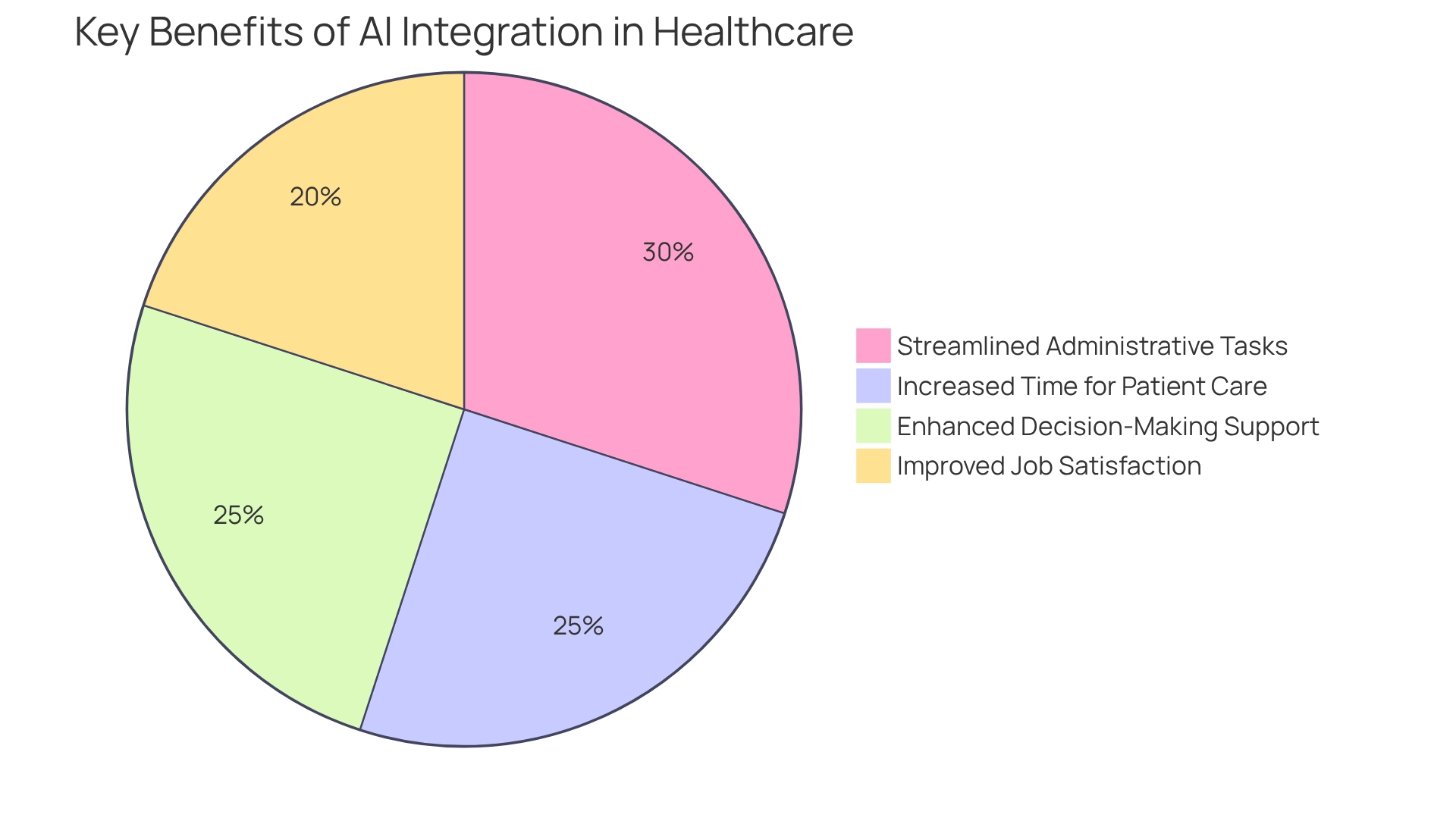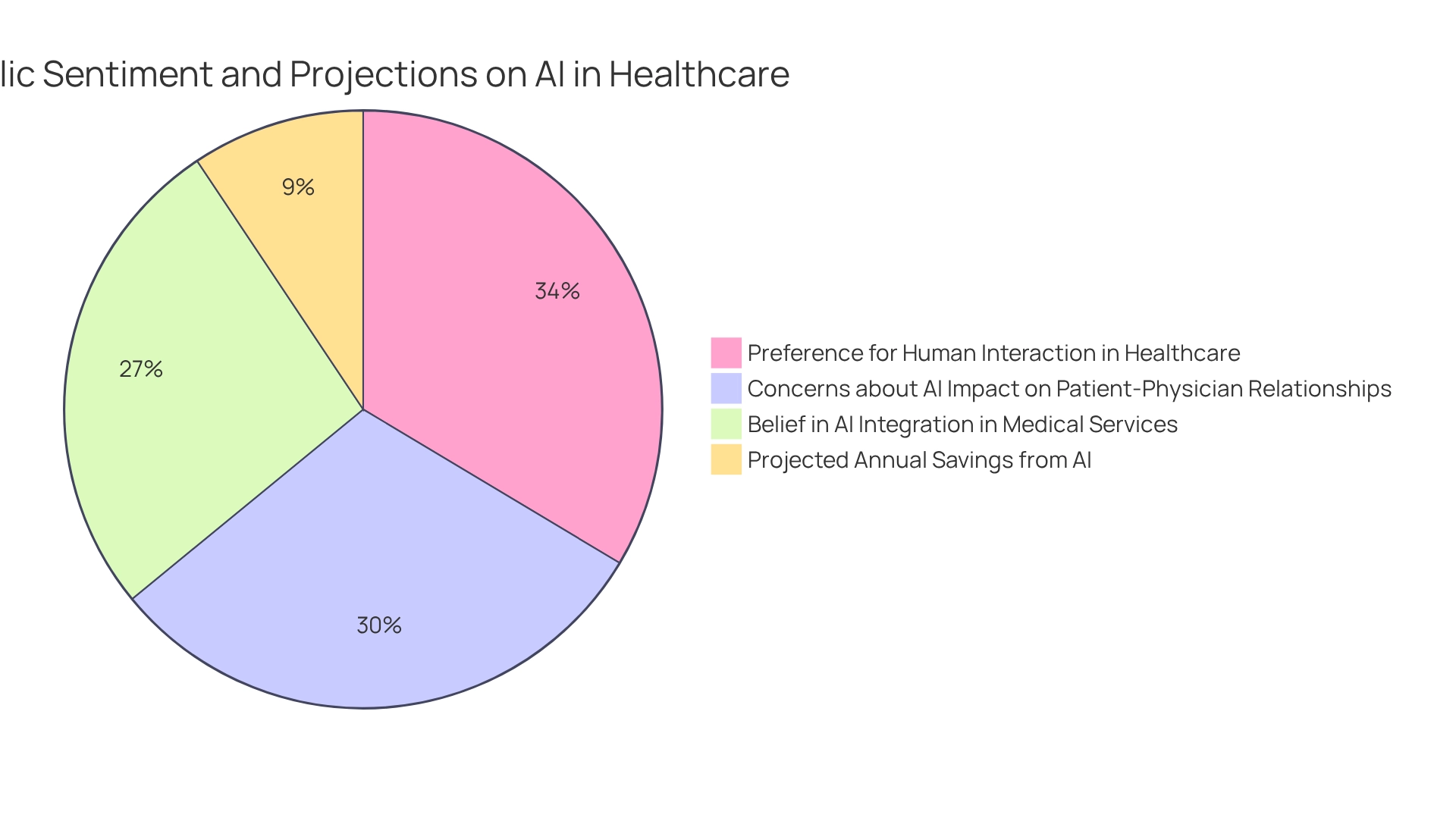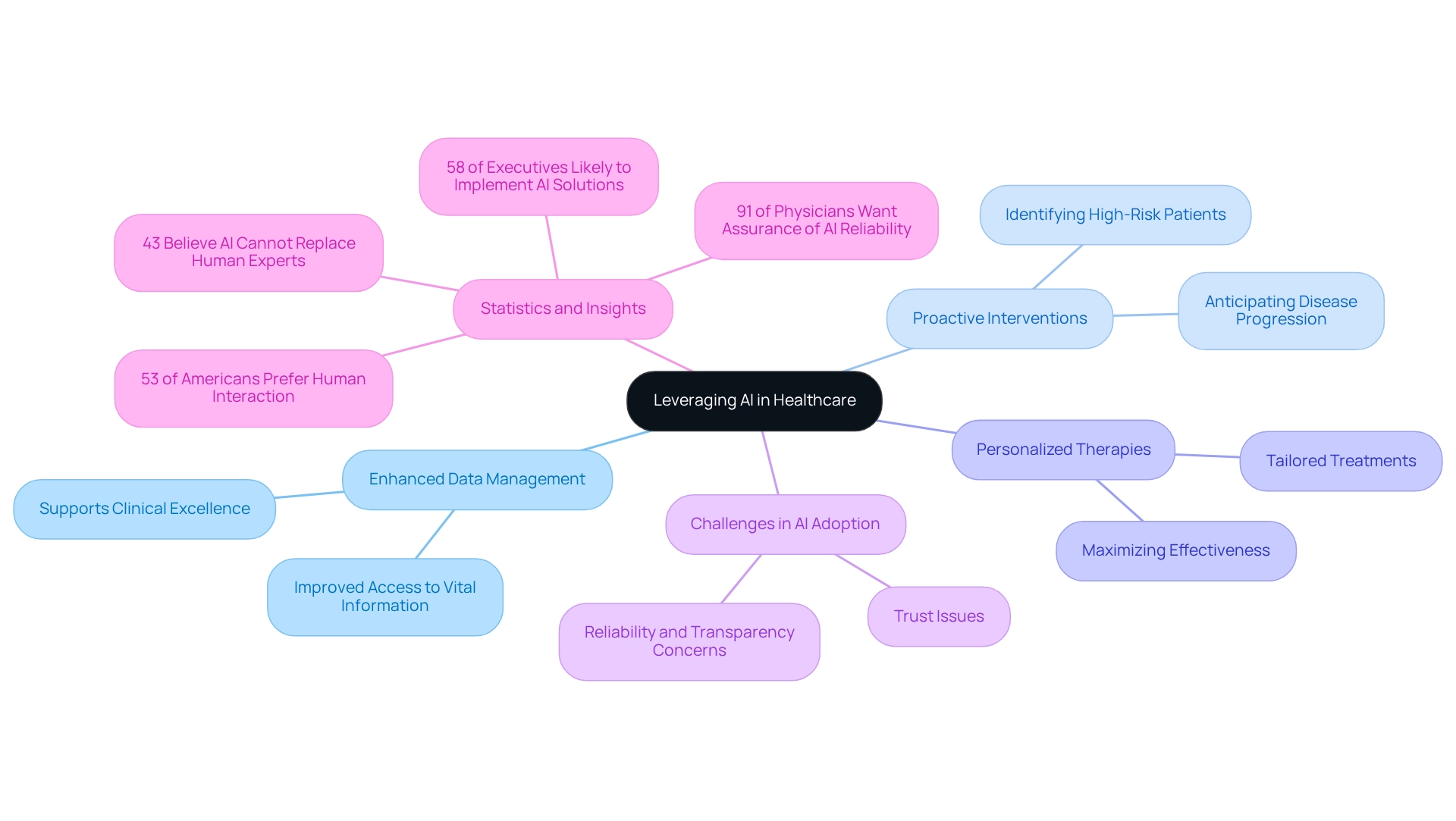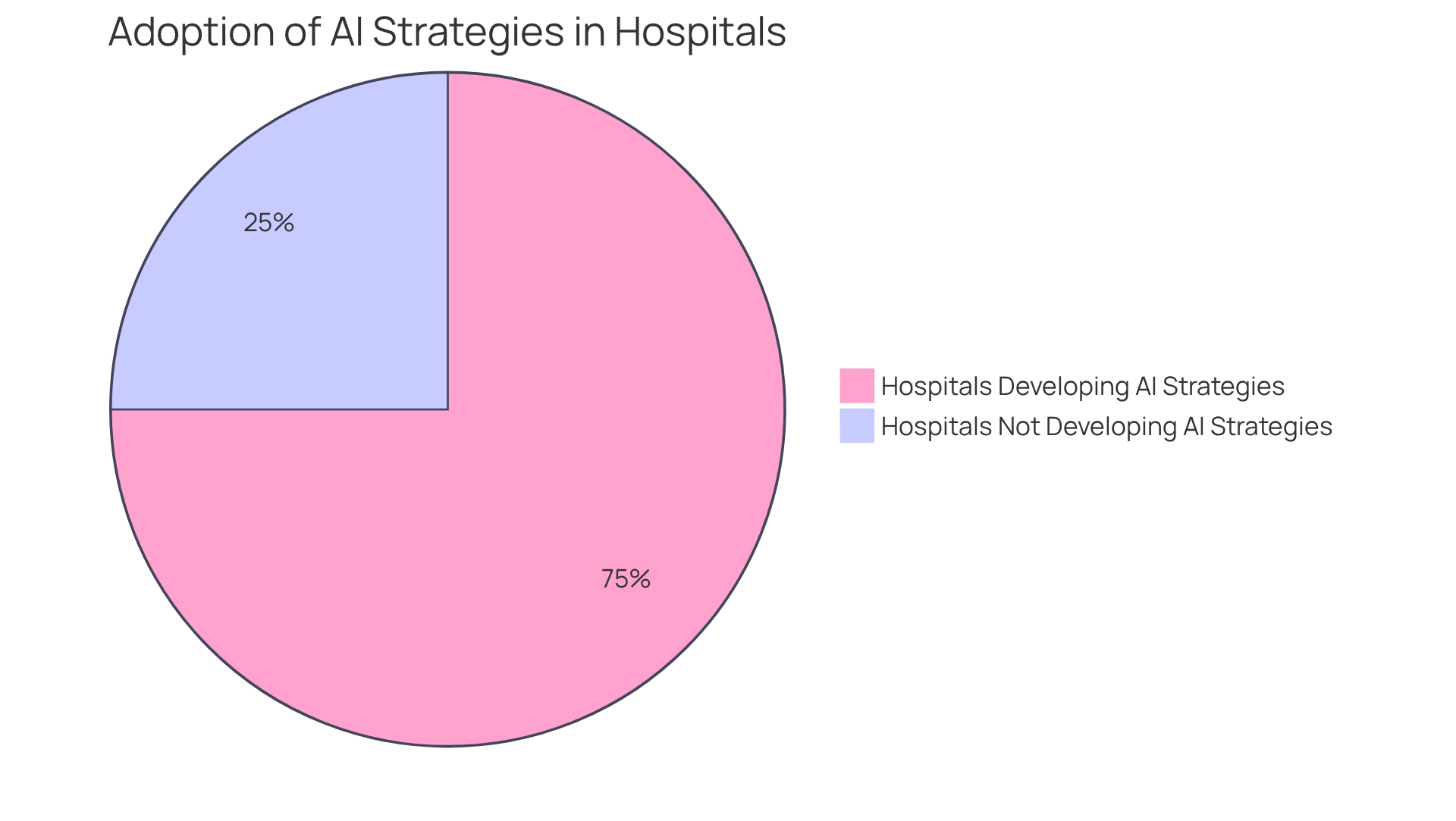Overview
In the demanding world of healthcare, providers often face overwhelming administrative burdens that can detract from their primary focus: patient care. Have you ever felt that the weight of paperwork and compliance issues takes time away from your patients? This article explores compliant GPT solutions designed to alleviate these challenges, offering a pathway to a more efficient and compassionate healthcare environment.
By automating administrative tasks and ensuring HIPAA compliance, technologies like CosmaNeura and BastionGPT empower healthcare providers to reclaim valuable time. Imagine a workday where you can dedicate more energy to your patients, enhancing both their experience and your job satisfaction. These AI solutions not only streamline operations but also foster an environment where quality care thrives.
Ultimately, embracing these innovative tools can transform the way healthcare is delivered. It’s time to consider how integrating AI into your practice can lead to improved service delivery and a more fulfilling work life. Let’s take the first step together towards a future where you can focus on what truly matters—your patients.
Introduction
In the ever-changing world of healthcare, many providers are grappling with overwhelming administrative tasks that take their focus away from what truly matters: patient care. How often do you find yourself buried in paperwork instead of spending time with your patients? The integration of artificial intelligence (AI) is emerging as a compassionate solution, offering relief from these burdens. By automating appointment scheduling and streamlining billing processes, AI technologies are enabling healthcare professionals to redirect their efforts toward delivering quality care.
As the demand for efficient, compliant, and secure healthcare delivery grows, platforms like CosmaNeura, BastionGPT, and Doximity GPT are stepping up to transform operations. These innovative tools not only enhance workflow efficiency but also ensure adherence to essential regulations like HIPAA, allowing you to focus on what you do best. Imagine a world where administrative tasks are handled seamlessly, giving you more time to connect with your patients and address their needs.
This article explores the many ways AI is reshaping healthcare. We will highlight the tools designed to improve workflow efficiency, enhance patient interactions, and elevate the overall quality of care provided across the sector. Join us on this journey to discover how embracing AI can lead to a more compassionate and effective healthcare environment.
CosmaNeura: Streamlining Administrative Tasks for Healthcare Providers
CosmaNeura understands the emotional challenges that medical professionals face, particularly the overwhelming administrative burdens that can hinder their ability to provide quality care. By pioneering AI technology tailored for healthcare, CosmaNeura aims to alleviate these pressures, allowing practitioners to concentrate on what truly matters: delivering exceptional clinical experiences. Imagine a world where appointment scheduling, medical record management, and billing are seamlessly automated, freeing up valuable time for patient interaction. This transformation is vital, as even minor can significantly impact patient care, underscoring the urgent need for effective solutions.
The integration of AI not only enhances administrative efficiency but also profoundly influences the productivity of medical professionals. Many clinicians are hopeful that AI will play a pivotal role in their decision-making processes in the near future. The momentum for AI adoption is unmistakable, and recent advancements in compliant gpt promise breakthroughs such as improved early disease detection and reduced medical expenses. How could these innovations, including compliant gpt, reshape the future of healthcare? Furthermore, the urgency for platforms like CosmaNeura is clear, especially as many medical executives have yet to embrace generative AI solutions. CosmaNeura is committed to ethical practices, ensuring that its operations resonate with the values of faith-oriented medical providers. By alleviating administrative burdens, the platform fosters greater job satisfaction among clinicians, empowering them to focus on their primary goal: client support. As the medical landscape evolves, AI solutions like CosmaNeura are not just enhancing operational efficiency; they are revolutionizing the standard of care provided to individuals.
Consider the potential benefits of integrating AI into your practice:
- Streamlined administrative tasks
- Increased time for patient care
- Enhanced decision-making support
- Improved job satisfaction
As we navigate these changes together, it’s essential to recognize that embracing AI is not merely a technological shift; it is a compassionate response to the needs of healthcare providers and their patients alike.

BastionGPT: Ensuring HIPAA Compliance in AI Interactions
In the demanding world of healthcare, professionals often face emotional challenges that can weigh heavily on their ability to provide care. The burden of administrative tasks and concerns about data breaches can detract from their primary focus: the well-being of their patients. BastionGPT offers a compassionate solution that is not only HIPAA-compliant gpt but also specifically designed for medical professionals, easing these concerns.
By adhering to , BastionGPT significantly mitigates risks associated with data breaches and unauthorized access to sensitive information. This is especially important in light of recent statistics revealing that the medical sector accounted for 79% of all reported data breaches in 2023, with a slight increase from 720 breaches in 2022 to 725 in 2023. Hacking and IT-related incidents continue to pose serious threats.
As healthcare providers increasingly turn to AI technology, the complexities of data protection become paramount. BastionGPT is a compliant gpt that not only ensures compliance but also strengthens the overall security framework, allowing medical professionals to focus on delivering quality care while safeguarding individual privacy.
Looking ahead to 2025, the emphasis on compliant gpt in AI medical solutions will only intensify. Tools like BastionGPT will be essential in maintaining trust and integrity in user interactions. As Megan Garza, Communications Manager for Varonis, aptly states, "Cybersecurity is crucial in today's medical environment, where data breaches can have serious implications for trust in individuals."
Healthcare professionals are encouraged to reflect on their compliance strategies. Could AI solutions like BastionGPT enhance your data security? By embracing these tools, you can foster a safer environment for your patients, ensuring their trust and your peace of mind.
CompliantChatGPT: Safeguarding Patient Data with AI Assistance
Compliant GPT is thoughtfully designed to optimize medical operations while placing a strong emphasis on protecting individual data. By utilizing advanced tokenization methods, it effectively anonymizes sensitive information, empowering medical providers to harness AI for documentation and communication without compromising HIPAA compliance. This innovative approach not only boosts operational efficiency by automating essential tasks like appointment scheduling and billing but also allows physicians to reclaim precious time, enabling them to focus on delivering high-quality care to their patients.
Imagine a world where healthcare providers can dedicate their full attention to patient interactions rather than being bogged down by administrative duties. Platforms like CosmaNeura exemplify how AI can alleviate these burdens, particularly for faith-based organizations. Dr. Michelle Thompson, a family medicine specialist, beautifully encapsulated this transformation: "AI has enabled me, as a physician, to be 100% engaged with those I serve." This underscores the profound impact AI can have on the quality of care, allowing providers to prioritize direct interactions with their patients.
Current tokenization methods in , such as data masking, encryption, and pseudonymization, are vital for safeguarding sensitive information. By integrating these techniques, compliant GPT not only addresses the pressing concerns of data breaches but also establishes a standard for secure data management in the healthcare sector. This ultimately revolutionizes service delivery and enhances patient-centered support, fostering a more secure and efficient medical environment.
As we navigate the complexities of healthcare, it’s essential to embrace solutions that prioritize both data protection and patient care. Consider how AI-driven tools like compliant GPT can not only protect individual data but also enhance workflow, creating a more nurturing environment for both providers and patients alike. Together, we can foster a healthcare system that truly values the connection between caregivers and those they serve.
Doximity GPT: Enhancing Workflow Efficiency for Healthcare Professionals
Healthcare professionals face immense emotional challenges, often burdened by administrative tasks that detract from their core mission: patient care. Doximity compliant gpt emerges as a transformative tool that automates essential tasks such as drafting client notes and managing communications. By seamlessly integrating into existing workflows, it enables clinicians to reclaim valuable time—potentially several hours each day—that can be redirected toward supporting their clients.
This newfound efficiency not only enhances job satisfaction among providers but also elevates the quality of care delivered to individuals. It addresses the concerns of risk-averse doctors who prioritize meaningful interactions with those they serve. However, it’s important to recognize that many medical startups encounter significant hurdles in gaining acceptance from these cautious practitioners, whereas compliant gpt solutions like Doximity have been effectively utilized across various medical environments, demonstrating their ability to improve workflow and foster client engagement.
The medical sector is projected to save $12 billion annually by 2027 through voice-enabled clinical documentation, underscoring the undeniable impact of AI tools like compliant gpt on productivity. Moreover, as 43% of Americans express a preference for human interaction in medical settings, the ability to focus more on patient engagement becomes increasingly vital. is expected to grow at a compound annual growth rate (CAGR) of 37.3% from 2023 to 2030, highlighting the growing significance of AI in healthcare.
A recent survey revealed that one third (34%) of Americans believe GenAI will be extensively utilized in medical services within the next five years, emphasizing the anticipated integration of AI technologies. Yet, we must also acknowledge that 39% of respondents are concerned about the potential impact of AI on the patient-physician relationship. This signals a need for thoughtful consideration as these technologies evolve, ensuring that the essence of compassionate care remains at the forefront.

Epic: Leveraging AI for Improved Healthcare Operations
Epic is leading the way in transforming medical operations by integrating AI capabilities into its Electronic Health Record (EHR) systems. This innovative approach significantly improves data management for individuals, enabling more precise and prompt access to vital information. By simplifying administrative processes, Epic empowers medical practitioners to focus on providing personalized care, which is crucial for enhancing patient outcomes.
The benefits of AI in clinical decision-making are profound. With AI-driven insights, including predictive analytics, providers can anticipate disease progression and identify patients at higher risk. This leads to proactive interventions that enhance patient outcomes. Additionally, AI algorithms facilitate personalized medicine by analyzing genetic markers and treatment responses. This allows for tailored therapies that maximize effectiveness and minimize adverse effects. A recent survey revealed that 91% of physicians seek assurance that generative AI materials are crafted by medical experts. This underscores the importance of reliability in AI applications. Furthermore, 53% of Americans feel that AI cannot replace the experience of a human health expert, while 43% prefer human interaction. These insights highlight the need for a balanced approach in AI adoption.
As medical executives increasingly recognize the potential of AI, 58% are likely to implement or purchase AI solutions within the next year. This indicates a growing trend towards AI integration in the medical field. According to Wolters Kluwer, among surveyed medical leaders who are implementing generative AI, 59% are already partnering with third-party vendors to develop customized solutions. This reflects the collaborative nature of AI advancements in the sector.
Epic's commitment to embedding AI in its EHR systems not only enhances operational efficiency but also aligns with the broader movement towards adopting technology that supports clinical excellence. By utilizing AI for improved diagnostic precision and predictive analytics, Epic is revolutionizing medical service delivery and addressing physician burnout. However, challenges remain, as highlighted in the case study "," which discusses the dual nature of AI—its opportunities and challenges. As AI progresses, its role in reshaping medical service delivery will become increasingly evident, paving the way for a future where technology and human skills collaborate to enhance care while ensuring adherence to HIPAA regulations.
Key Solutions to Consider:
- Enhanced Data Management: Improved access to vital information.
- Proactive Interventions: Anticipating disease progression.
- Personalized Therapies: Tailored treatments for maximum effectiveness.
In this evolving landscape, let us embrace the potential of AI while nurturing the human touch that is so essential in healthcare.

Azure OpenAI: HIPAA-Compliant AI Solutions for Healthcare
In today's fast-paced healthcare environment, organizations face significant emotional challenges as they navigate the complexities of patient care alongside administrative burdens. Azure OpenAI offers a compassionate solution with a compliant GPT platform that fully adheres to HIPAA regulations. This platform is designed to facilitate secure data handling and processing, allowing medical providers to leverage AI technology without compromising individual privacy.
With the increasing volume of electronic communications—reported to have surged by 57% since the onset of the COVID-19 pandemic—healthcare professionals are seeking efficient solutions to manage their workloads. Azure OpenAI addresses this need by offering tools that streamline operations while ensuring compliance with stringent privacy standards, highlighting the importance of compliant GPT in AI solutions, especially regarding HIPAA compliance.
As of late 2022, the Office for Civil Rights (OCR) had settled 126 cases of HIPAA violations, totaling over $133 million. This highlights the essential need for secure data management in the medical field. By implementing Azure OpenAI, organizations can confidently adopt AI solutions like compliant GPT that enhance operational efficiency and improve care outcomes, thereby mitigating the financial risks associated with non-compliance.
Moreover, expert insights emphasize the importance of information access policies, ensuring that the right individuals have appropriate access to (ePHI) at the right time. Azure OpenAI is designed with the principle of compliant GPT in mind, reinforcing the importance of compliance in their platform.
As medical organizations increasingly invest in cybersecurity—projected to exceed $125 billion from 2020 to 2025—adopting secure AI platforms like Azure OpenAI is essential for protecting sensitive information and fostering trust in medical delivery. This trend emphasizes the necessity for medical professionals to invest in compliant GPT technologies to protect client data effectively.
Are you ready to embrace the future of healthcare with confidence? Azure OpenAI stands as a supportive partner in your journey towards enhanced patient care and operational efficiency.
Giva: AI Solutions for Compliance and Efficiency in Healthcare
In today's demanding healthcare environment, many providers face emotional challenges that can hinder their ability to deliver quality patient care. The burden of administrative tasks often leaves little room for meaningful patient interactions. CosmaNeura understands these struggles and offers innovative AI solutions specifically crafted to improve compliance and operational efficiency within faith-based medical environments, utilizing compliant gpt technology. By automating administrative tasks, CosmaNeura ensures strict compliance with regulatory standards, allowing primary healthcare professionals to prioritize high-quality patient support. Our advanced tools not only streamline processes but also significantly reduce operational costs, ultimately enhancing service delivery. As the medical field encounters growing compliance challenges, CosmaNeura's innovations, particularly the compliant gpt, are crucial in tackling these issues. They empower practitioners to concentrate on patient-centered care. In 2025, the incorporation of AI technologies will be recognized as a strategic method to alleviate staffing shortages and clinician burnout, further emphasizing the importance of operational efficiency in healthcare with compliant gpt. Moreover, by addressing the intrinsic resistance to innovation within the medical community, especially among cautious practitioners, CosmaNeura demonstrates can revolutionize medical delivery while ensuring adherence. As the sole organization developing AI solutions for the billion-dollar faith-focused medical market, we are uniquely positioned to assist practitioners in navigating the complexities of contemporary medical care.
Key Solutions Offered by CosmaNeura:
- Automating administrative tasks to free up time for patient care.
- Ensuring compliance with regulatory standards to reduce stress.
- Streamlining processes to enhance service delivery.
Together, we can foster an environment where healthcare providers feel supported and empowered to focus on what truly matters: their patients. Let us help you navigate these challenges and create a more compassionate healthcare experience.
Telehealth AI: Transforming Patient Interactions and Documentation
Telehealth AI is truly transforming user interactions by offering real-time assistance during virtual consultations. These advanced AI tools empower healthcare providers to document encounters with remarkable accuracy and efficiency, significantly alleviating the administrative burden that often weighs heavily on telehealth services. By automating labor-intensive tasks like documentation, appointment organization, and , AI allows doctors to reclaim precious time, enabling them to focus on delivering high-quality service to those they treat.
Effective communication regarding AI usage can cultivate trust and clarity, which are essential for sustaining strong therapeutic relationships with individuals. This is particularly emphasized in the case study '.' As telehealth adoption continues to rise, with a notable increase in AI integration, the impact on documentation efficiency becomes increasingly evident. Have you considered how this technology could ease your daily challenges?
While statistics indicate that errors in AI transcription can occur—especially in sessions with varying audio clarity—some studies suggest error rates of up to 20% in challenging conditions. This underscores the importance of having reliable AI support. By enhancing the quality of patient care and streamlining documentation processes, Telehealth AI not only improves the overall experience for practitioners but also enriches patient interactions, aligning with the compassionate spirit of medical services.
Healthcare professionals are encouraged to explore how they can implement AI tools in to maximize these benefits. Imagine a practice where administrative tasks are minimized, allowing you to spend more time connecting with your patients. It’s time to embrace the future of healthcare with AI support.
AI-Driven Billing Optimization: Maximizing Revenue in Healthcare
In today's healthcare landscape, many medical professionals face overwhelming administrative burdens that can detract from their primary focus: patient care. AI-driven billing optimization tools are stepping in to transform , offering a compassionate solution to these challenges. By automating billing processes and providing precise coding suggestions, these tools not only enhance revenue potential but also significantly reduce errors. This means healthcare providers can spend less time on paperwork and more time attending to their patients' needs.
Current trends reveal that 75% of hospitals are actively developing AI strategies to tackle revenue cycle challenges. This statistic underscores the urgent need for efficient solutions that align with the goals of medical professionals. As Patrick Murphy, General Manager of TruBridge, points out, "Seventy-five percent of hospitals are working on an AI strategy to tackle revenue cycle challenges." Such insights highlight the critical importance of innovative approaches in the evolving medical environment.
Moreover, strategic alliances between medical providers and technology firms are proving essential for the successful implementation of cloud and AI technologies. These collaborations pave the way for a more efficient billing process, ultimately benefiting both healthcare providers and their patients. For instance, a case study on strategic partnerships in the medical field illustrates how teamwork can lead to successful AI implementations.
As we look ahead to 2025, the integration of AI in billing practices is expected to bring significant improvements in revenue cycle management. This evolution emphasizes the importance of these tools in the changing medical landscape while adhering to ethical principles grounded in compassion and care. Let us embrace these innovations together, fostering a healthcare environment where providers can thrive and patients receive the attention they deserve.

AI Diagnostic Guidance: Enhancing Clinical Decision-Making in Healthcare
are transforming clinical decision-making, offering healthcare providers valuable insights and actionable recommendations. These advanced tools sift through extensive medical data, suggesting potential diagnoses that empower clinicians to make informed and precise decisions. By integrating AI into the diagnostic process, we not only enhance accuracy but also significantly minimize the chances of errors, ultimately leading to better patient outcomes.
Have you ever felt overwhelmed by the sheer volume of information available? Recent studies reveal that AI's role in healthcare is rapidly expanding. Notably, nearly 64% of clinicians in South America and the Asia Pacific region express confidence in AI's potential to positively influence their decision-making in the coming decade, especially in diagnostic guidance. This optimism mirrors a broader trend, as 38% of U.S. adults believe that AI will enhance medical outcomes, underscoring the growing recognition of AI's advantages in clinical settings.
AI-driven tools can alleviate the burden of labor-intensive administrative tasks, allowing healthcare professionals to focus more on direct patient care. This shift not only boosts efficiency but also enables clinicians to see more patients and reduce waiting times. Furthermore, AI algorithms analyze vast amounts of medical data—such as medical history, symptoms, and test results—to assist physicians in crafting accurate diagnoses and personalized treatment plans. By uncovering patterns that may elude human doctors, AI facilitates timely and precise interventions.
Moreover, AI tools empower individuals by providing access to reliable health information through chatbots and virtual assistants, encouraging them to take an active role in managing their health. Remote monitoring technologies enable continuous health tracking, paving the way for early intervention strategies that can significantly improve outcomes.
Case studies illustrate the effectiveness of AI in disease prevention, showing that it can reduce hospital admissions by over 50% through early detection and risk prediction. As one specialist noted, "Reducing hospital admissions by over 50% isn’t solely about enhancing patient outcomes—it’s about decreasing costs, optimizing resource distribution, and making medical systems more sustainable." Such advancements not only strengthen healthcare systems but also lower operational expenses, fostering sustainability in assistance.
As we approach 2025, the landscape of clinical decision-making is poised for further evolution, with AI diagnostic guidance tools like compliant gpt becoming integral to healthcare practices. These tools are crafted to be compliant gpt, enhancing diagnostic accuracy, streamlining workflows, and ultimately improving the quality of care provided to patients. Healthcare providers are increasingly acknowledging the value of AI in their practices, with many citing improvements in diagnostic accuracy and overall job satisfaction as key benefits of embracing these technologies.
Conclusion
The integration of artificial intelligence in healthcare signifies a profound shift in how providers manage their responsibilities and care for patients. Have you ever felt overwhelmed by the administrative tasks that seem to pile up? Platforms like CosmaNeura, BastionGPT, and Doximity GPT illustrate the positive impact of AI in streamlining operations, ensuring compliance with regulations, and enhancing patient interactions. By automating appointment scheduling, billing processes, and documentation, these tools empower healthcare professionals to focus on what truly matters—providing high-quality, compassionate care to their patients.
Moreover, the importance of HIPAA compliance and data security through solutions such as BastionGPT and Azure OpenAI cannot be overstated. With the healthcare sector under increasing scrutiny regarding data breaches, adopting AI technologies that prioritize patient privacy is essential for maintaining trust. As the demand for efficient and secure healthcare delivery grows, the strategic implementation of AI tools not only mitigates risks but also fosters a more resilient healthcare environment.
As healthcare continues to evolve, embracing AI technologies will be crucial in addressing challenges like clinician burnout and staffing shortages. Imagine a world where AI enhances workflow efficiency and diagnostic capabilities, allowing healthcare organizations to optimize operations and elevate the quality of care provided. The future of healthcare lies in the seamless integration of technology and human expertise, paving the way for a more effective and compassionate approach to patient care. The journey toward this future is already underway, and the potential benefits are immense for both providers and patients alike. Let's continue to explore these advancements together.




